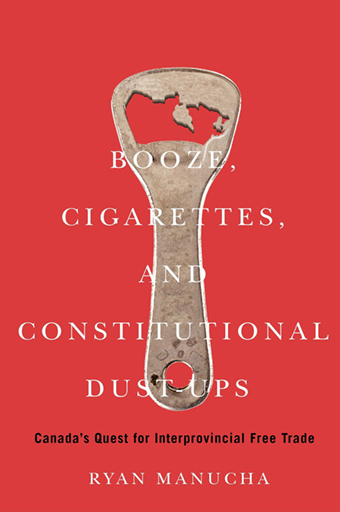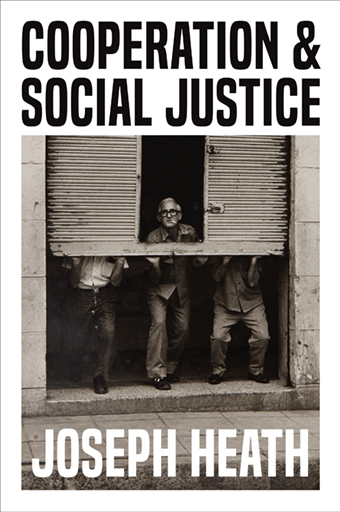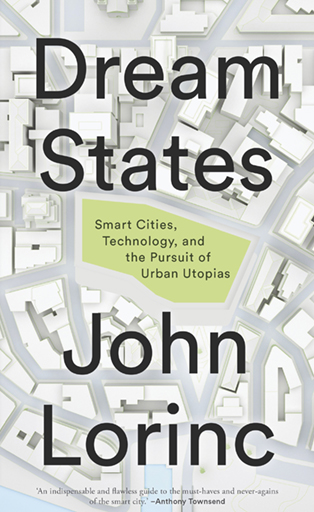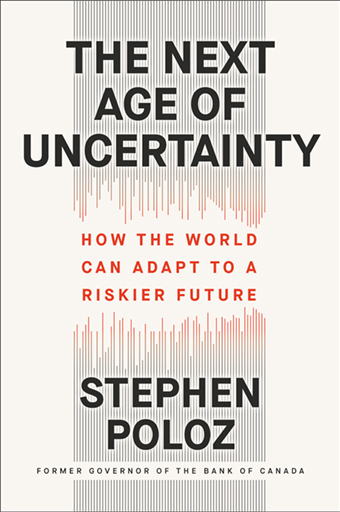Winner
Booze, Cigarettes, And Constitutional Dust-Ups: Canada’s Quest for Interprovincial Free Trade (McGill-Queen’s University Press)

This book skillfully weaves together an understanding of international and domestic trade policy, a review of legal cases, history and, refreshingly, consideration of the actual practical operations of tribunals and secretariats. The author explores ways of analysing and including Indigenous considerations, and draws on economics, political science, history, constitutional and administrative law to tell a stirring account of Canada’s changing approaches to removing internal trade barriers.
Ryan Manucha is a scholar of interprovincial trade law. A graduate of Harvard Law, he has written extensively on the topic of Canada’s economic union for the nation’s leading think tanks, published works in outlets such as The Globe and Mail, CBC Radio. He was recently commissioned to provide policy analysis to a provincial government.
Runners Up
Cooperation & Social Justice (University of Toronto Press)

In six tightly written, highly original essays, Heath provides innovative, clear ideas of political philosophy that touch on important policy topics today ranging from capitalism vs socialism, profit, egalitarianism, stigmatization, and race relations. This very impressive book will be important for policy makers, challenging them to consider their policy proposals through the lens of feasibility as well as some basic facts of human behavior, which can often collide with abstract ethical and legal principles.
Joseph Heath is Professor in the Department of Philosophy and the Munk School of Global Affairs and Public Policy at the University of Toronto. A fellow of the Royal Society of Canada and the Trudeau Foundation, Heath is the author of several books including Enlightenment 2.0, which won the Shaughnessy Cohen Prize for Political Writing in 2015, and The Machinery of Government, which won the Donner Prize for best book in public policy in 2020.
Dream States: Smart Cities, Technology, and the Pursuit of Urban Utopias (Coach House Books)

Lorinc has given us a fascinating, superbly researched book that explores the actual meaning of those two hackney words “Smart Cities”. Both sound and original, with touches of humour, it covers urban infrastructure from sewers to pandemics and climatic shocks to governance, in both historical and current perspectives. This will be of interest to a broad range of readers in private and public realms, and across many sectors including urban planning, engineering, education, transportation, and public health.
John Lorinc is a Toronto freelance journalist and editor focusing on cities, politics, business, climate change, and local history. John has won numerous National Magazine Awards for his journalism and was the 2019–20 Atkinson Fellow in Public Policy, which produced a series of ten articles on smart cities that were the basis of Dream States.
The Next Age of Uncertainty: How the World Can Adapt to a Riskier Future (Allen Lane Canada)

Poloz has written a big-picture analysis with concrete policy ideas for what both business and the public sector should do as we move into the next age of uncertainty. He describes the five “tectonic” forces — demographics, technological progress, inequality, indebtedness, and climate change — bringing the five strands together with insight, accessibility, and anecdote. Poloz stresses that uncertainty is here to stay, and we must learn to incorporate it into our policy making. Well-written, clear, and focused, this book is necessary for anyone with an interest in our economic future.
Stephen Poloz is one of the world’s foremost economists with over 40 years of experience in economic and investment research, forecasting, banking, and policymaking. After a long career at Export Development Canada, ending as President and CEO, he recently finished a seven-year term as Governor of the Bank of Canada. He is currently a Special Advisor for Osler, Hoskin & Harcourt LLP.
Canadian Policing: Why and How It Must Change (Delve Books)

There has been much written about policing in Canada, however this book stands out for the breadth of its analysis; the multiple reasons, persuasively invoked, to bring about fundamental change; and the wide-ranging nature of the remedies proposed. Not only are the issues clearly defined, the analysis sound and solutions identified – this book digs deep into the system to explain the why and the how, and provides a new light on the future of policing and public safety in Canada.
Kent Roach a professor at University of Toronto Faculty of Law, was elected to the Royal Society of Canada in 2002, awarded the Molson Prize for contributions to social sciences and humanities in 2017 and appointed to the Order of Canada in 2017. His numerous books have won dozens of awards. He has served on a number of commissions of inquiry including the Maher Arar, Ipperwash, Air India and Goudge inquiries.
Louise Frechette
Louise Fréchette was the Deputy Secretary-General of the United Nations from 1998 to 2006, following a career in the Public Service of Canada, serving notably as Ambassador to Argentina and Uruguay (1985-1988), Ambassador to the United Nations (1992-1994), Associate Deputy Minister of Finance (1995) and Deputy Minister of National Defence (1995-1998).
Since leaving the UN in 2006, Fréchette has been associated with a number of academic and research institutions in Canada and abroad. In June 2019, Fréchette completed a 3-year mandate as Chair of the Supervisory Board and of the Council of CARE International after serving as chair of CARE Canada from 2011 to 2015. She is currently a Board member of the Global Leadership Foundation.
Louise Fréchette has a degree in History from the University of Montreal and a Certificate in Economy from the College of Europe in Bruges, Belgium. She is an Officer of the Order of Canada.
Jean-Marie Dufour
Jean-Marie Dufour, O.C., O.Q., is the William Dow Professor of Economics at McGill University, and Fellow of the Econometric Society, the American Statistical Association, the International Association for Applied Econometrics, the Canadian Economics Association (CEA), and the Royal Society of Canada. He is also the Director of the Canadian Econometric Study Group, and Research Fellow at CIRANO and CIREQ. Dr. Dufour has served as President of the CEA.
He has also held a Bank of Canada Research Fellowship, a Canada Research Chair (Econometrics, Université de Montréal), the Pierre-de-Fermat Chair of Excellence (Toulouse School of Economics), the Banco Santander Chair of Excellence (Madrid), and has received numerous prizes, including the Killam and Léon-Gérin Prizes for Social Sciences, the John Rae Prize (CEA), a Guggenheim Fellowship, and the Konrad Adenauer Research Award (Germany).
Jack M. Mintz
Jack M. Mintz is the President’s Fellow of the School of Public Policy at the University of Calgary after serving as the Palmer Chair and founding Director from January 1, 2008 to June 30, 2015. He serves on the boards of Imperial Oil Limited and senior fellow to numerous think-tanks including the C. D. Howe Institute, MacDonald-Laurier Institute, CESIfo Germany and International Tax and Investment Centre, Washington D.C.
Jack Mintz also served on numerous panels and boards at the federal and provincial levels including Vice-President and chair of the Social Sciences and Humanities Research Council 2012-2018. He has consulted widely with the World Bank, the International Monetary Fund, the Organization for Economic Co-operation and Development, federal and provincial governments in Canada, and various businesses and non-profit organizations in Canada and abroad.
Jack Mintz became a member of the Order of Canada in 2015 as well as receiving the Queen Elizabeth Diamond Jubilee Medal in 2012 for service to the Canadian tax policy community. Jack Mintz’s 2001 book Most Favoured Nation was shortlisted for the Donner Prize
Maureen O’Neil
Maureen O’Neil chairs the board of WaterAid International and is a member of the boards of the Centre for International Governance Innovation and the Centre for the Study of Living Standards.
She is the former senior executive officer of EHealth Ontario and the Canadian Foundation for Healthcare Improvement (CFHI).
Maureen O’Neil is former chair of the board of the United Nations Research Institute for Social Development (UNRISD), the Board of Trustees of the International Institute for Environment and Development, Chair of the Board of Carleton University, former President of the International Development Research Centre, IDRC’s Think Tank Initiative and earlier in her career Deputy Minister of Citizenship in Ontario.
She has also represented Canada on the UN Commission on the Status of Women and on committees of the Organisation for Economic Co-operation and Development and has been a member of the UN Committee for Development Planning and the Board of the UNRISD.
She has received honorary doctorates from Laurier University, Carleton University, and the University of Ottawa. In June 2011, Maureen was named an officer of the Order of Canada for public service, recognizing her contributions to international development, gender equality and human rights.
Karen Restoule
Karen Restoule is a Vice President at Crestview Strategy based in Toronto. She is adept at fostering collaboration among parties to bring divergent views together to develop shared success, and specializes in organizational governance, change leadership, policy development, and stakeholder and Indigenous engagement.
Prior to joining Crestview Strategy, Karen led an environmental consulting firm working with Indigenous communities, building on a prior role supporting First Nations leaders as Director of Justice at Chiefs of Ontario where she advanced innovative policy solutions to legacy challenges. She also co-founded BOLD Realities, to advance the industry-Indigenous relationship. Previously, Karen led the modernization of Ontario’s administrative justice system at Tribunals Ontario.
Karen is a graduate of the University of Toronto and of the University of Ottawa’s French Common Law Program. She serves on a number of boards, has received awards for her contribution to society, and is a contributor to thehub.ca. Karen is Ojibwe from Dokis First Nation.
Frederick Wien
Fred Wien served as Director of the Maritime School of Social Work at Dalhousie University from 1981-86 and then as Deputy Director of Research at the Royal Commission on Aboriginal Peoples heading the research program on employment and economic development.
At the national level, he has served as a member and chair of the Advisory Board for the Institute of Aboriginal Peoples Health (IAPH/CIHR). He is the Nominated Principal Investigator for a major research grant from CIHR for the project: “A Poverty Reduction Approach to Improving the Health and Well-being of First Nation Communities in Canada” as well as for a CIHR-funded project on “Building a Social Policy Framework for the Health and Well-being of Mi’kmaq Communities in Nova Scotia”.
A graduate of Queen’s University, with M.A. and PhD from Cornell University, Wien was made a Member of the Order of Canada in 2015
